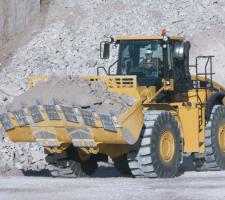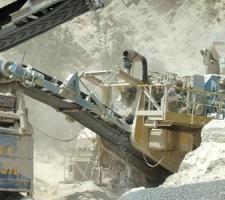While the global financial crisis is yet to hit aggregate prices significantly the impact on volumes is already being felt. Metso Minerals' Luis Santos talks to Claire Symes about market changes in Europe during 2008
Ex-works aggregate prices are usually a good indicator of the state of the sector but 2008 appears to be the exception to the rule and it is declining volumes that are pointing to the problem areas.
In 2007 the aggregates market Europe, Middle East and Africa region was valued at an estimated €28billion and the figure for this year is expected to slightly exceed that. But it is strong growth in the Middle East and gains in Russia and Eastern Europe that are offsetting the declines seen elsewhere in Europe this year to keep the market volume at a static 4.8billion tonnes in 2008.
"Aggregate prices have not changed significantly over the last 12 months," said
"The economic situation exploded in July and August this year but there has been the smell of a financial crisis in the air since the start of the year. What will be key for the aggregates sector is how the governments around Europe react to prevent the global banking problems creating a widespread recession.".
According to Santos, both the Portuguese and Spanish governments are looking to animate their markets through infrastructure investment but he believes that other governments need to be rapidly looking at similar strategies to head off long term problems.
"Governments have been very worried about the banking systems and have been focusing a lot of attention on saving these but, in my opinion, it is infrastructure investment that is needed quickly to avoid doubling of current unemployment rates," he said. "The current financial problems all stem from bad debt management over the last four or five years based on speculation of future growth and we are now paying the price. I remain optimistic about the market at the moment but the next 18 months are likely to be very difficult economically for the whole region and this has implications for the aggregates market." According to Santos, the drop in aggregates volumes already seen in the Spain, Ireland and the UK will be repeated in other European countries if governments do not find other ways to push the economy back up. He also believes that prices will drop slightly as demand falls.
Changing fortunes
In addition to declining construction in Spain, Ireland and the UK, Santos has also seen a drop in activity in Norway over the last 12 months and he said that the Portuguese market, which has been in recession for several years, is likely to continue contracting.
"While the volumes of aggregates produced in these countries has already fallen, the average prices have yet to be significantly affected and they remain quite stable from 2007 levels," he said.
In many areas the high costs of fuel and energy means there is very little room for aggregate prices to fall and the business to remain profitable. As an example, Santos points to Portugal where the average price for limestone is around €3 per tonne, while crushed rock reaches €6 per tonne - 50% below the average value in 2003. "There is just no room for further downturns there," he said.
"In Spain aggregate prices vary greatly from region to region with the highest prices seen in Catalonia and the lowest ones near the centre of the country around places such as Madrid. In Barcelona, the current average price for limestone is the same as it was in 2007 at €6 to 7 per tonne, which is quite high given the wide availability of limestone in Spain and I would have expected the price there to have already dropped to nearer €5 per tonne." In the UK, prices remain steady at around €7 to 9 per tonne for crushed rock and €5 to 7 per tonne for concrete aggregates.
In France, Santos expects volumes this year to be down 10 to 20million tonnes on 2007 levels. "Normally when there is the threat of financial problems, the French market is quickly affected but this time it has not happened," he said. "France seems to be benefitting from the 'Sarkozy effect' which is helping to retain confidence in the market and aggregate prices for both hard rock and concrete aggregates have remained steady at €7 to 9 per tonne this year." Santos believes that this pattern will also benefit the aggregates market in Belgium, which he said generally mirrors the French market in terms of both prices and volume changes.
Despite its recent return to growth following the post-reunification recession, Germany's aggregates market is suffering, according to Santos, but the drop in volumes is slower than that in the UK and likely to reach 680million tonnes for the full year. Aggregate prices for hard rock are around €6 to 9 per tonne and €4.5 to 6 for concrete aggregates.
Santos believes that Italy's market is still doing well but said that it is not an easy market to predict with a wide variation in prices. "Prices for hard rock aggregates in Italy can vary from €4.5 to 11 per tonne depending on the location of the quarry," he said. "Concrete aggregates prices are more consistent at around €4.5 to 5 per tonne." .
Despite the decline expected, Santos believes that a few markets in Europe will post growing volumes for the full year of 2008. "Aggregate volumes in are still growing in emerging markets," he said. "Countries like Romania and Bulgaria are still expanding and are likely to continue doing so provided access to EU funds remains available. Prices in these regions are also high at €12 to 15 per tonne mainly due to supply and demand issues but local regulation also causes inflation." Russia is likely to be fairly static and remain at 2007 levels in terms of volumes and prices are also expected to remain high at €20 to 25 per tonne.
Cementing stability
According to Santos, cement prices in Europe have remained relatively stable everywhere in Europe except Russia over the last year. "When you look at the price drop in Russia in percentage terms, 39% falls sound dramatic but the price needs to be viewed in comparison with others in Europe and this puts the drop into context. "The average price in Europe is about €70 to 75 tonnes but in Russia in March this year it was nearer €190 per tonne, so the fall to €110 per tonne is bringing it more into line with prices elsewhere in the region."
Santos said that the only countries where cement prices are higher than Russia are Mexico and Nigeria but added that the prices in Russia are more related to culture and buying habit than the recent dropping of import embargoes from China and Turkey. "Turkey has an oversupply of cement but Russia has a need to import material," he said.
Further falls?
Looking ahead to 2009, Santos believes that there will be further falls in aggregate volumes and some lowering of aggregates prices across Europe. "It is going to be a tough year unless some miracles appear from the governments of the Big Five [France, Germany, Italy, Spain and the UK] in the form of rapid infrastructure investment," he said. "France is the best prospect for this but it will take time for the projects to get onto site.
"I believe that it may be 2010 before we start to see a turnaround - hopefully in the first six months. Next year is likely to see downturns in most economies with the exception of the Middle East and some hot spots in Africa."
















